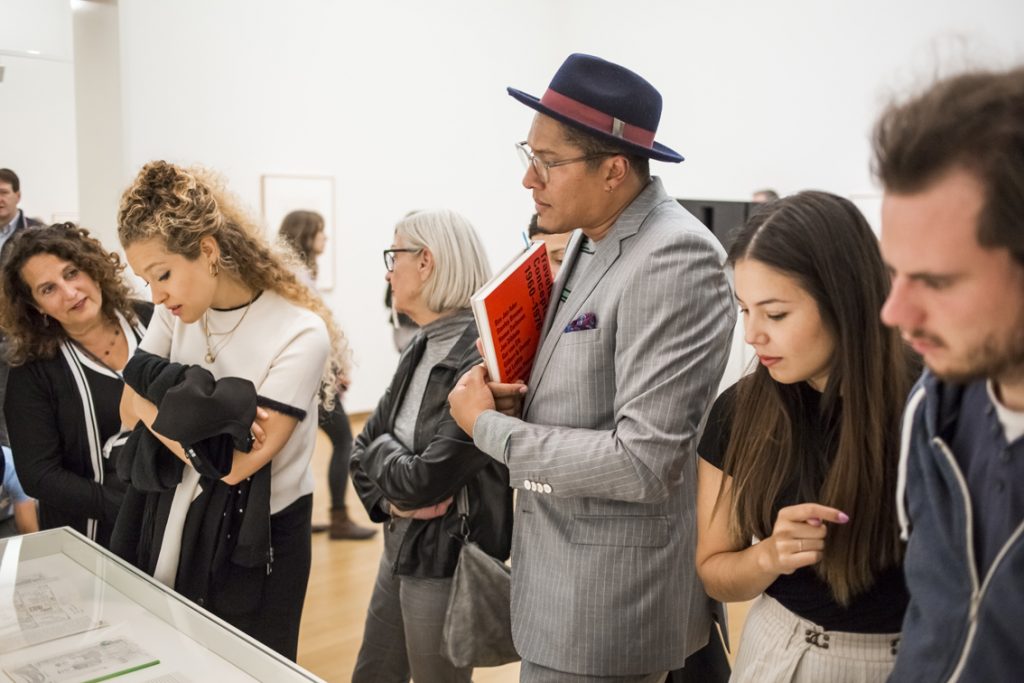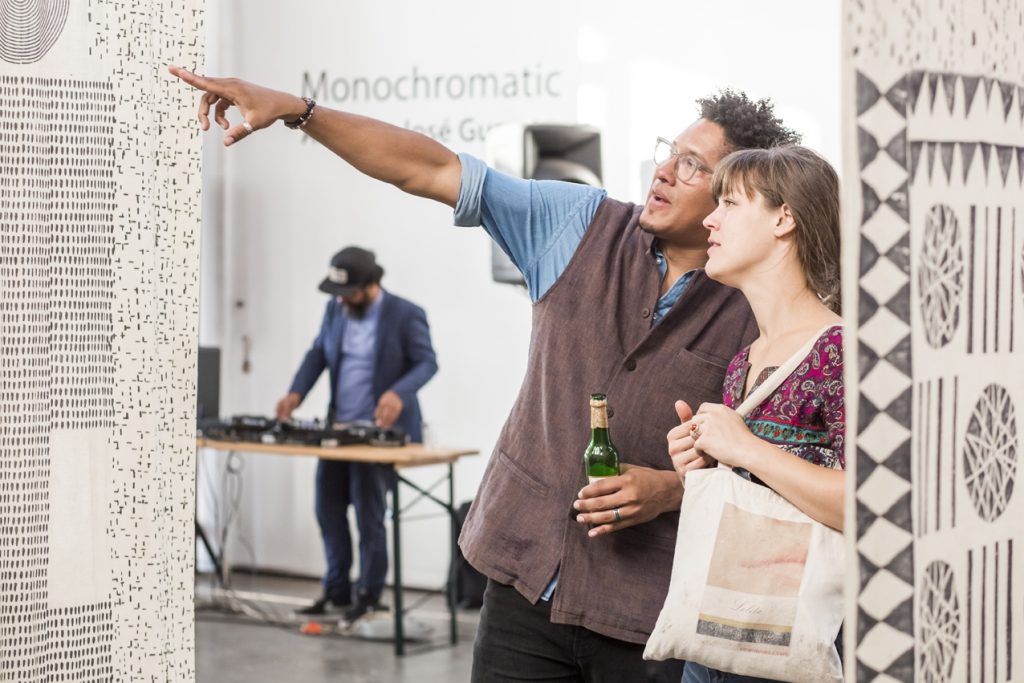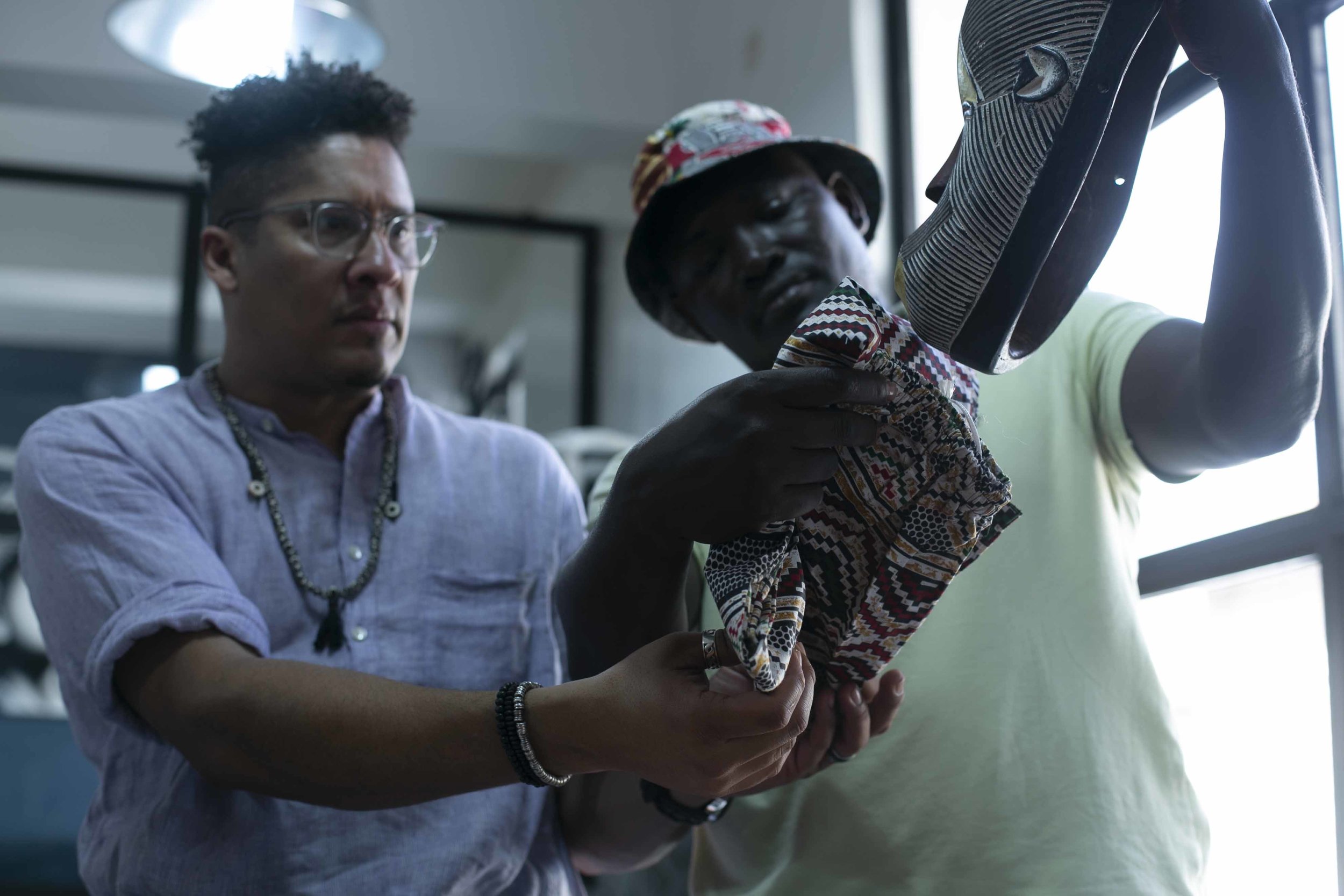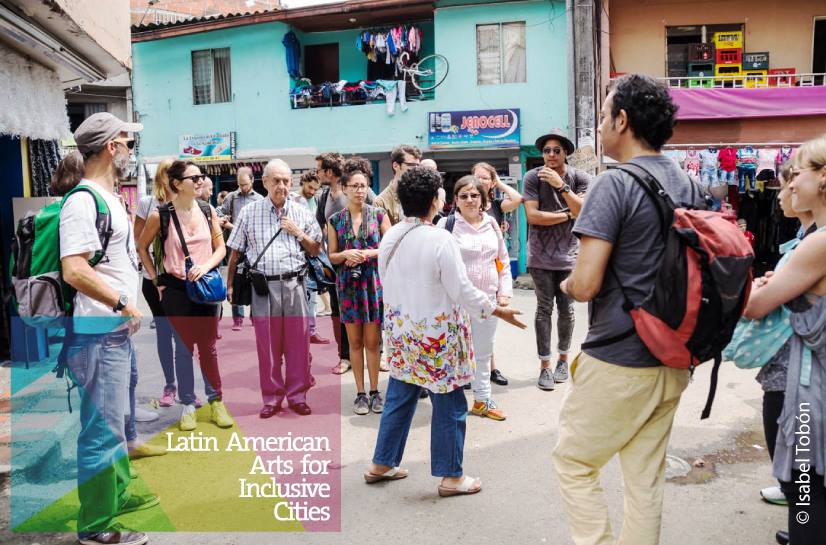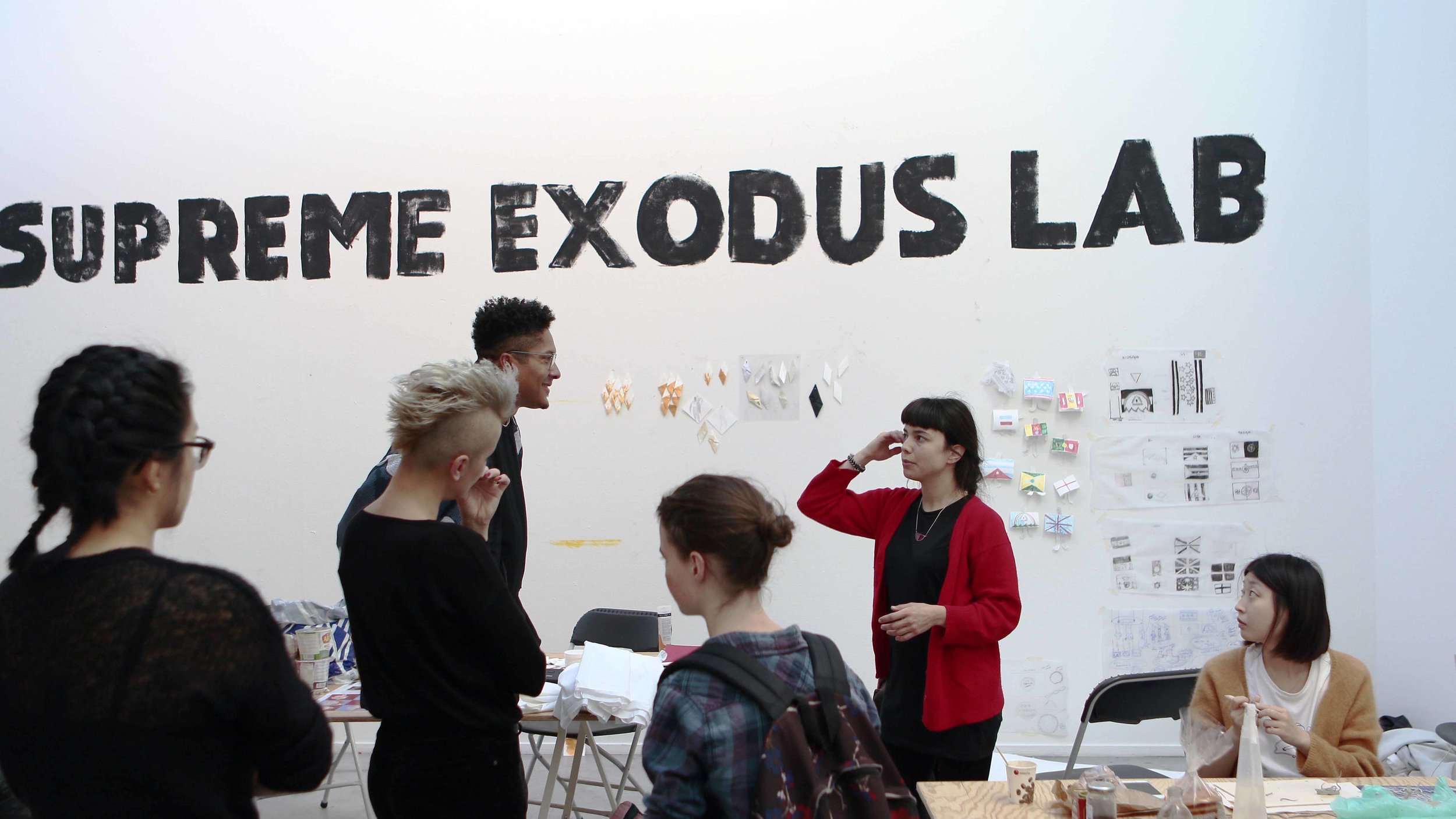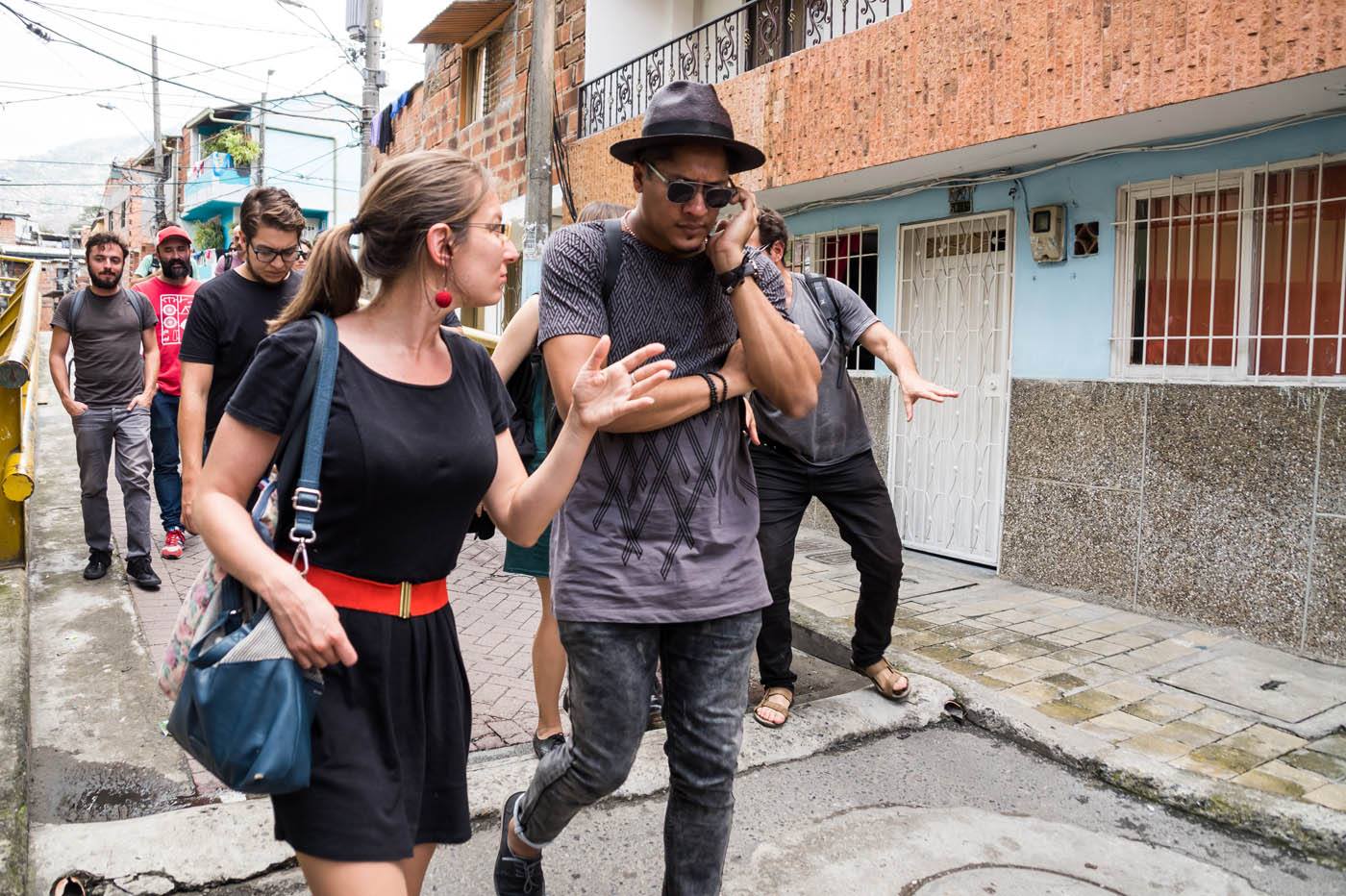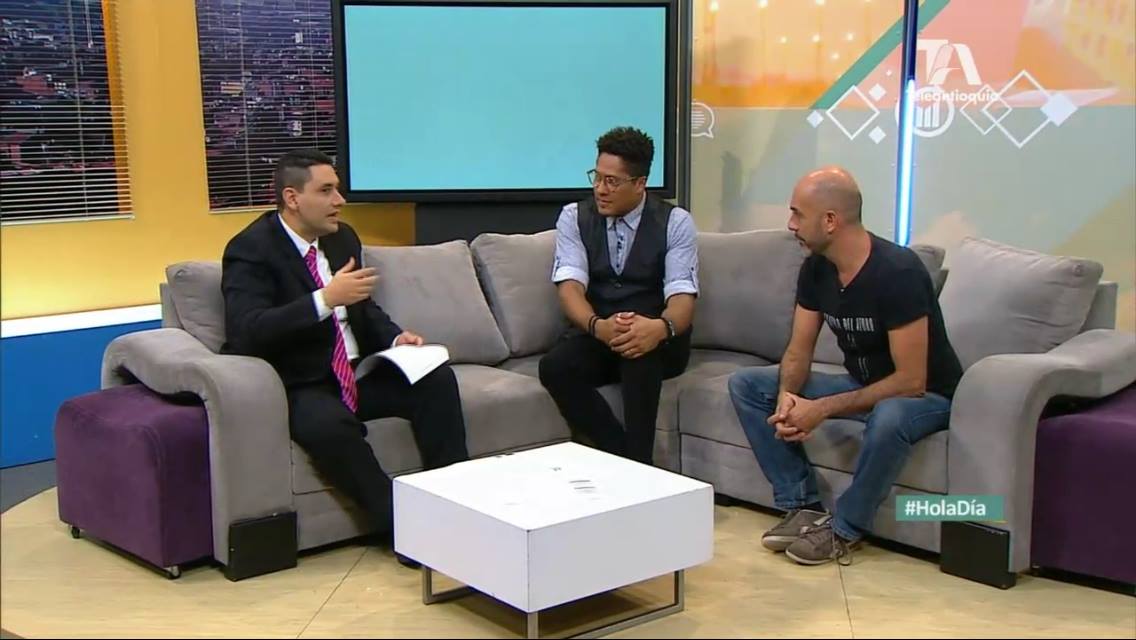Antonio jose guzman - lecturer, researcher, mentor - visual arts
“My lecture programs aim to stimulate intercultural dialogues and foster an inclusive arts community. As a mentor, I guide students in developing their artistic practice, with a strong emphasis on critically approaching current social issues and encouraging innovative, cross-border art practices.”
“In their ongoing artistic collaboration, Antonio Jose Guzman and Iva Jankovic incorporate indigo textiles, soundscapes, and performances to address how our world has been shaped by colonialism and migration. Participating Artists: 60th International Art Exhibition, La Biennale di Venezia”
Antonio Jose Guzman is a renown lecturer and a dedicated textile and decolonial researcher with an impressive career spanning over three decades in the visual arts. Throughout his extensive experience, he has significantly contributed to the academic and artistic communities with his innovative and transformative educational methodologies. Guzman's work primarily focuses on decolonial thinking and diversity, aiming to challenge and reshape traditional perspectives and practices within the visual arts and beyond.
His pedagogical approach is renowned for its ability to change ways of thinking and profoundly transform his students. By fostering an environment that encourages critical reflection and open dialogue, Guzman empowers his students to question existing narratives and embrace a more inclusive and equitable understanding of cultural histories and identities. His teachings are not just about imparting knowledge but about inspiring a shift in consciousness that enables students to see the world through a decolonial lens.
A key aspect of Guzman's approach is his emphasis on collective orientation and transcultural cultural analysis. He believes that learning is a communal process that benefits from diverse perspectives and collaborative efforts. By integrating these principles into his teaching, Guzman creates a dynamic and participatory educational experience that bridges cultural gaps and fosters mutual understanding among his students. His work highlights the importance of recognizing and valifying different cultural contributions, thus promoting a more holistic and interconnected view of the world.
Moreover, Guzman's research and teachings are deeply rooted in the belief that art and education can be powerful tools for social change. He advocates for the role of the visual arts in addressing social justice issues and dismantling colonial structures that perpetuate inequality. Through his innovative projects and research, Guzman continues to push the boundaries of traditional art education, encouraging his students to use their creative talents as a means of activism and societal transformation.
In summary, Antonio Jose Guzman stands out as a pioneer in the field of textile and decolonial research, whose work has left an indelible mark on the visual arts and education. His commitment to decolonial thinking and diversity, combined with his unique educational methodologies, not only transforms students' ways of thinking but also contributes to a broader movement towards a more inclusive and just world. By fostering collective orientation and transcultural cultural analysis, Guzman paves the way for a new generation of artists and thinkers who are equipped to challenge the status quo and make meaningful contributions to society.
“By fostering collective orientation and transcultural cultural analysis, Guzman paves the way for a new generation of artists and thinkers who are equipped to challenge the status quo and make meaningful contributions to society.”
“professional experience”
Lecturing - Academic Appointments
2024 Instruction: Educational Programme; La Biennale di Venezia
2022 - Present: Guest Tutor Sandberg Institute and Artwell Residencies
2022 Theory and Textile Decoloniality Lecturer; Gerrit Rietveld Academie
2022 Examination Board at Sandberg Institute
2018 - 2022: Program advisor at Nieuw Dakota
2018 - 2021: Advisor Art and Cultural Heritage at The Mondriaan Fund
2016 -2017: Curator Latin American Cartographies, Bozar Centre for Fine Arts, Brussels
2016 - 2020: Tutor BEAR - ArtEZ Bachelor Experiment Art & Research
2020 - 2021 Committee Member Jury Prix de Rome
2020 Examination Board at Gerrit Rietveld Academy
“Recommendation letters”
To whom it may concern,
I am Samantha Isabel Pellarini, a Venezuelan/Italian multidisciplinary visual artist working and residing in the city of Groningen. I met Antonio Guzman during my fine art studies at Academie Minerva in Groningen. Antonio has been a great mentor in my career as well as an important influence on my artistic development. I have been a foreigner my whole life, and this fact has been an inspiration for my art research and concept development.
During Guzman's course at Minerva, we worked together on his project "The Supreme Exodus," which was inspired by large migration groups. For this project, we created costumes, wearable sculptures, and performances that concluded in an exhibition followed by a large parade through the city, culminating at the Groninger Museum.
Guzman's guidance through the making of this project was remarkable. I learned curation and organization skills, concept development, and, most importantly, how to embed one's own history into one's artistic practice. Antonio is an outstanding mentor with a multicultural background, making him suitable for working with diverse groups. He is attentive and caring to his students and can definitely have an impact on their career development.
Kind regards,
Samantha Isabel Pellarini
I am writing to wholeheartedly recommend Antonio Jose Guzman for the lecturer position in your Institution. I had the pleasure of being a student of his mentorship during my graduation year from the Gerrit Rietveld Academie in 2020, and it was an enriching experience.
Guzman is an exceptional educator, bringing both passion and expertise to the connection he establishes with students. The learning environment he created felt open, honest, flexible, understanding and caring. His own practice and experience felt grounding while being in touch with him in relation to our developing practices. Guzman takes the time to understand each student's unique strengths and areas for improvement, offering tailored advice and support. The contact we have established in 2020 endured many years since then. In summary, I believe that Guzman would be an outstanding addition to your faculty. I am confident that he will inspire and positively impact many more students in the future.
Sincerely,
Mayis Rukel
I am pleased to recommend Antonio José Guzman based on their exceptional feedback during our assessment at the Gerrit Rietveld Academie in June 2020. Despite the challenges of COVID-19 during that period, Antonio was very supportive of the students, and provided me with very sharp insights on my graduation project, focusing on the cultural implications of it, its aesthetic output and it conceptual meaning. Antonio demonstrated a deep understanding of my background, their approach resulting both professional and personal, making the assessment process both productive and enjoyable.
Kindly,
Paula Garcia Sans
To whom it may concern,
I am writing to highly recommend Antonio Jose Guzman for the position at your esteemed institution. I had the privilege of meeting Antonio in 2023 during the São Paulo Biennial, where we immediately connected through our mutual interest in Afro-diasporic cultural manifestations and the complexities of identity. Since our initial meeting, we have maintained an active dialogue, sharing research and discussing potential projects that explore sound, pedagogies, and the histories of the Black Atlantic.
Antonio’s artworks, which I had the pleasure of experiencing firsthand at the 60th Venice Biennale and the Barbican in London during the "Unravel" exhibition, are a testament to his profound research and artistic vision. His ability to translate complex research into compelling visual narratives that emphasise collective thinking and making is truly remarkable. Each piece was a rich expression of the multitude of ideas and historical contexts he explores.
In addition to his exceptional artistic and academic prowess, Antonio is remarkably generous with his knowledge and networks. His ability to connect people and foster collaborations has directly benefited my own projects, opening up new opportunities and enhancing the scope of my work. Antonio has also served as an informal advisor on several of these projects, offering insightful and thoughtful advice. His proactive approach, coupled with his creativity in problem-solving, has been invaluable.
Antonio’s deep understanding of his field, combined with his collaborative spirit and mentoring capabilities, makes him an ideal candidate for a teaching and advisory role. His commitment to collective knowledge-building and his dedication to fostering inclusive and dynamic learning environments will undoubtedly make him an asset to your institution.
I am confident that Antonio Jose Guzman will excel as a visual arts lecturer, teacher, advisor, and mentor. His unique blend of expertise, creativity, and generosity will greatly benefit your students and faculty. Please do not hesitate to contact me if you require any further information.
Sincerely,
Beatriz Lobo Britto
Curator, iniva - Institute of International Visual Arts
My art classes are based on multidisciplinary decolonial education. During the studies, I help students to develop their visual and artistic qualities. Students go through a deep psychological thinking transformation. I use cognitive visual arts as an instrument to learn how to still our minds through art making in different media. Doing so we are able to create a bridge between art, concept, theory and presentation. I introduce students to a successive series of visual experiments aimed at improved conceptualism in the depiction of our world, I call this “making and matching.” I would also discuss contributions made by artists like Basquiat, Wilfredo Lam, Duchamp and Bas Jan Ader.
The classes seeks to encourage applied thinking within the artistic field, investigating how we might both produce and discuss art, as well as communicate. Inciting experimentation and initiative, within art production, writing and theory. Theory will be viewed as a practice, and practice will be theorized. Key issues are critical thinking, conceptual spaces, politics of representation and the possibility of sculpturing and artistic universe in each ones artistic practice.
The axiom of my classes is that the artist is the scientist, the theme is the experiment, and that cognitive visual arts is the microscope that puts everything into focus. Each practice is centered around the theme. The entire class is an experiment on concepts, research and the evaluation of the artistic practice, taking quantum leaps in the evolution of art work and projects.
“Lecture series:”
BEAR (Base for Experiment, Art & Research) ArtEZ University of the Arts - The Gerrit Rietveld Academy - Sandberg Institute - Minerva Art Academy
As a lecturer and mentor, I have engaged with students across various esteemed institutions over the last decade. My focus spans both bachelor’s and master’s programs in visual arts, where I guide students through the complexities of contemporary visual art practices.
At Bear Arnhem, I lead discussions and workshops that challenge traditional narratives and encourage students to explore alternative perspectives through their art. By examining historical contexts and contemporary issues, we collectively deconstruct colonial frameworks and create art that speaks to diverse, global experiences.
At Rietveld Academy, my mentoring extends into studio practices where I work closely with students to develop their unique artistic voices. Through critical feedback sessions and collaborative projects, I help them navigate the intersections of identity, culture, and power, fostering a supportive environment for artistic experimentation and growth.
In the master’s program at Sandberg Institute, we delve deeper into theoretical and practical aspects of decolonial art. My lectures focus on advanced concepts in visual semiotics and the role of art in social change. I encourage students to engage in interdisciplinary research, combining insights from visual arts, anthropology, and critical theory to produce works that challenge societal norms and provoke thought.
At Minerva Academy, I facilitate collective art projects that emphasize community engagement and social responsibility. By collaborating on public art installations and community-based initiatives, students learn to use their art as a tool for activism and change, addressing issues such as migration, identity, and environmental justice.
Across these institutions, my approach is rooted in fostering a critical understanding of the world and empowering students to use their artistic talents to address and dismantle systemic inequalities. Through lectures, workshops, and one-on-one mentoring, I aim to inspire the next generation of artists to create work that is not only aesthetically compelling but also socially and politically impactful.
Exploring the Intersections of Artistic Languages
Art, as an ancient form of human expression, has always been integral to our understanding of culture and identity. From cave paintings to contemporary installations, art has been a medium to tell stories, express emotions, and share ideas and observations about our world. Through it, we gain insight into the individuals who created it and the societies they lived in. By exploring different artistic languages, we delve into diverse perspectives, unveiling the complexity and richness of human experience.
Each artistic language—whether painting, sculpture, dance, music, literature, theater, cinema, or others—has its unique characteristics and potential. However, the boundaries between these forms are fluid, often intersecting and influencing one another. This interplay is particularly evident in contemporary art, where blending languages and embracing transdisciplinarity are the norms.
Analyzing the relationships between various artistic languages not only enriches our understanding of art but also enhances our appreciation of interdisciplinarity. By connecting art with other disciplines such as history, sociology, philosophy, and the natural sciences, we foster a holistic view of human creativity. This approach aligns with my commitment to decolonial thinking, which challenges traditional narratives and emphasizes the importance of diverse voices and experiences.
We focus on community-building projects that use art as a tool for social change and empowerment. By engaging communities in collaborative art projects, we create spaces for dialogue, reflection, and action. These projects emphasize circularity, where ideas and practices are shared, reinterpreted, and reimagined, creating sustainable and inclusive artistic practices. Through this exploration, we not only appreciate the interconnectedness of artistic expressions but also recognize their role in fostering community, promoting social justice, and envisioning a more inclusive and equitable world.
Graduate Program in International Affairs / The New School University - New York City
DNA as a Work of Art: Processes of Semiosis between Contemporary Art and Biology: The world has experienced thousands of years of migration; starting from migrating nomads in the Fertile Crescent and East Africa to the medieval Migration Period and modern-day political and economic migration. Our identities are the product of our ancestors’ traveling experiences through Polynesia, Eurasia, Mesopotamia, Africa, and eventually to America and Europe. This implies that our genetic identity is based on the various diasporas of our ancestors, and thus on the decisions they made in migrating to one place or another.
By playing with the intersections between artistic and scientific discourses, we investigate how the representation of identity functions as a polysemy across different semiotic domains. Using visual semiotics to examine the intersections between sign systems across these domains, we provoke some of the communication aspects of how new modes of art function in present-day communities. By illustrating the complexity of this process as part of transforming expert knowledge into pedagogical practice, I support improving teacher education in the arts and cultural domain.
Windward School Los Angeles - Mapping L.A – Los Angeles, California
This course was thematically developed for workshops and lectures with students of the Windward School in Los Angeles, California. The course maps, with photography and drawings, the critical topographies of Los Angeles from the '70s to now, focusing on the cultural politics of space, time, and segregated neighborhoods.
Predominantly looking at site-specific practices, we examine how mapping and architectonic conditions have engaged with ideologically charged cultural landmarks, the destruction, and reconstruction of the urban environment. Classes are thematically structured and draw from a wide range of cross-cultural and interdisciplinary theories and art projects. We trace the personal geographies and ancestry of every student, and we also use GPS mappings of their daily life. Our inquiry extends to how localized understandings of space and time are fixed markers of cultural identity. The information from the research will be used as data visualization for maps that will generate an idea of the way the cities are forming themselves towards the future. The maps will demonstrate areas of transculturalism or homogeneous cultures, incomes, and preferences.
Dutch Art Institute (DAI) Master at the ArtEZ
The Dutch Art Institute (DAI) is one of the master courses at the ArtEZ Faculty of Art and Design. The DAI provides emerging artists with a two-year English-taught program that enables them to deepen their exploration of theoretical, conceptual, and productional aspects of contemporary art practice.
Instead of asking its master’s students to be present at the institute daily, the DAI offers an alternative educational environment: once per month (11 times per year), students, faculty, and invited guests come to the DAI in Arnhem for a full week and take part in an energetic residential program that lasts from early morning until late at night. The week is structured by a dense weaving of workshops, seminars, lectures, performances, presentations, and face-to-face conversations between individual students, faculty, and guests.
Camp OMI - Ghent, New York
In my art education workshops, we address social responsibility and sustainable issues. Fine art is one of the last fields to be engaged in social responsibility and ecological awareness; students traditionally have been taught to express themselves without regard to the larger societal context in which their work exists. Education Omi encourages people of all ages to interact with contemporary art and ideas in a community-oriented environment. Through a variety of programs, we aim to build bridges between the local community and professional artists and their artwork.

















